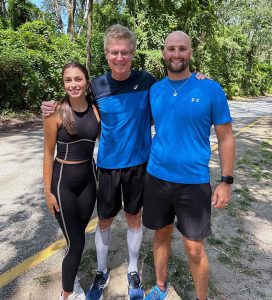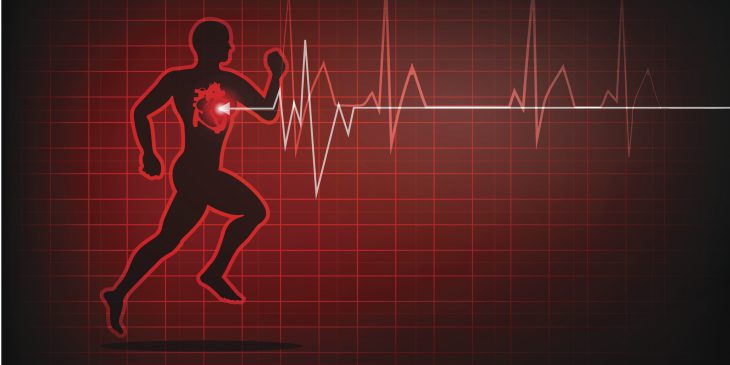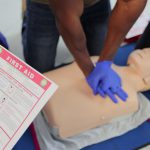Most people who’ve suffered cardiac arrest wouldn’t consider themselves lucky. In many ways, though, Greg Woodman was.
This summer, Greg traveled from State College to Erie for the Presque Isle Half Marathon. Around the four-mile mark, Greg collapsed.
Other runners rushed to his aid, including Austin Boesch, who had recently completed the Student Nurse Intern program at UPMC Hamot, and Mikaela Hess, BSN, professional staff nurse, Emergency Department, UPMC Hamot.

Greg Woodman, center, recently had a chance to meet and thank Mikaela Hess, BSN, and Austin Boesch. The reunion took place at Presque Isle State Park, where Greg had collapsed during the half marathon.
“You put everything off to the side and do what needs to be done in the moment,” said Austin, who will graduate from PennWest Edinboro in December with a bachelor’s degree in nursing, at which time he will transition to a full-time position in the hospital’s Trauma-Neuro ICU.
Said Mikaela, “You fall back on your training. We all knew we did the best we could.”
Thanks to Mikaela and Austin, as well as the staff and physicians at UPMC Hamot, Greg is remarkably no worse for wear. He had two stents placed and was later able to return to Erie to meet Austin and Mikaela and express his gratitude.
Greg was “lucky” in the sense that he was not running by himself, in a remote location. He was surrounded by other people, including several with medical training, who knew what to do — begin chest compressions — and were able to remain calm despite the urgency of the situation.
Typically, “ordinary bystanders” are often the first on the scene of an emergency, such as a heart attack, vehicle accident, or uncontrolled bleeding.
If you unexpectedly came upon someone in cardiac arrest, would you know what to do in those first crucial minutes, before emergency medical personnel could arrive?
In an emergency, minutes matter.
UPMC launched the Minutes Matter initiative to provide community members with access to basic emergency information and education about life-saving interventions. The most common emergencies, where outcomes can be dramatically improved with life-saving interventions, include:
- – Overdose
- – Mental health crisis and suicide prevention
- – Cardiac events
- – Uncontrolled bleeding
From calling 911 — and knowing what to say — to clearing a path for emergency professionals, even the most basic knowledge can save lives and improve outcomes.
Learn more about Minutes Matter, to include access to training that could save a life.








